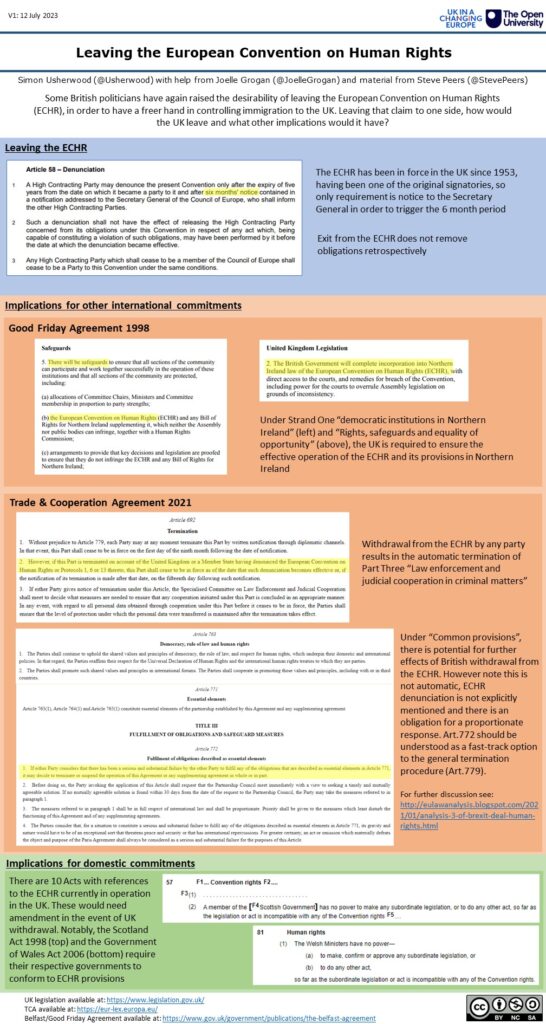A mild detour for me before the summer holidays kick in: the European Convention on Human Rights (ECHR).
Part of the wider logic of ‘taking back control’ was the need to unshackle the UK from other constraints on its freedom to do as it will, in order to address situations it faces. Just as leaving the EU was framed as becoming a more nimble and flexible international partner, so too has the status of the ECHR long been a sore point when it comes to managing migration, asylum and deportations.
The long saga of the Rwanda policy (Note to self: must make a graphic to try an unpick the logic) has only reinvigorated this latter point. Tory backbenchers talk about ‘leaving the ECHR’ now, just as they have done for some time, to allow the government to implement its democratically-agreed policy.
The graphic below takes such comments at face value. It explains how a state ‘leaves the ECHR’ (basically, you write a letter and wait six months), but also the various consequences.
The aim here is to highlight the interconnected nature of laws and of treaties: obligations towards the ECHR aren’t only found in the ECHR treaty itself.
None of what’s here is particularly new: Steve Peers wrote extensively about this within weeks of the TCA’s sign-off in early 2021, for example.
“That’s not what they meant”
When I posted this yesterday, the response was interesting, in that various people came back to argue that none of this was really about ‘leaving the ECHR’ (despite that being literally what was being said), but about ‘leaving the Court’.
The European Court of Human Rights (ECtHR) is created by the ECHR Convention to adjudicate on cases relating to provisions (Article 19, fact fans). A simple explanation would be that the ECtHR is the ECHR equivalent of the European Court of Justice in the EU, i.e. the final arbiter of the relevant provisions. That means those resident within ECHR signatories can ultimately take their cases up to Strasbourg for a ruling, which national courts then have to abide by.
In the UK case, there was a long period when that was pretty much the only way people could rely on ECHR provisions, because successive British governments hadn’t wanted to incorporate the Convention into domestic law. You still had the protection of the various provisions, but you had to make a lot of effort to enforce them.
This changed with the Human Rights Act 1998, which essentially gave people access to ECHR remedies from domestic courts. But doesn’t change the basic nature of British membership of the ECHR.
Which brings us back to the critique mentioned.
Maybe backbenchers want to bin the Human Rights Act. That they can certainly do, but it wouldn’t stop those pesky activists securing remedies and rulings from the ECtHR, so it’s not really a solution to their basic problem.
Maybe, as one person argued, it’s literally about the UK not being part of the ECtHR, while still being in the ECHR.
Without wanting to go all Donald Tusk, this is cherry-picking in its purest form.
The ECHR Convention only provides for complete denunciation (Article 58): you leave a bit, you leave completely. If the UK wanted to try for not having the ECtHR provisions apply to it, then it would have to secure a formal renegotiation of the Convention and the approval of the other members.
[Spoiler: those members aren’t going to agree to this]
In short, none of these paths are viable: being in the ECHR is like being pregnant – you either are or you aren’t.
Rule Britannia
The underlying tone in all of this debate is very much akin to that found in the Brexit debates: why can’t we just do what we want to?
The notion of the UK as a great nation, not to be told what to do, is a strong and pervasive one. But it also leads us to think that just because we want to do things in a particular way, others must let us.
One of the big takeaways I have from the past decade has been that international politics is about the clash of what everybody wants and that no one gets to decide things by themselves.
You want to make international arrangements? You need to get your international partners to agree.
You want to make a choice about something with an international dimension? You need to accept that others will react to that.
Which isn’t to say that ECHR membership is good or bad; just that it requires us to understand what that means and how it works.

PDF: bit.ly/UshGraphic122
